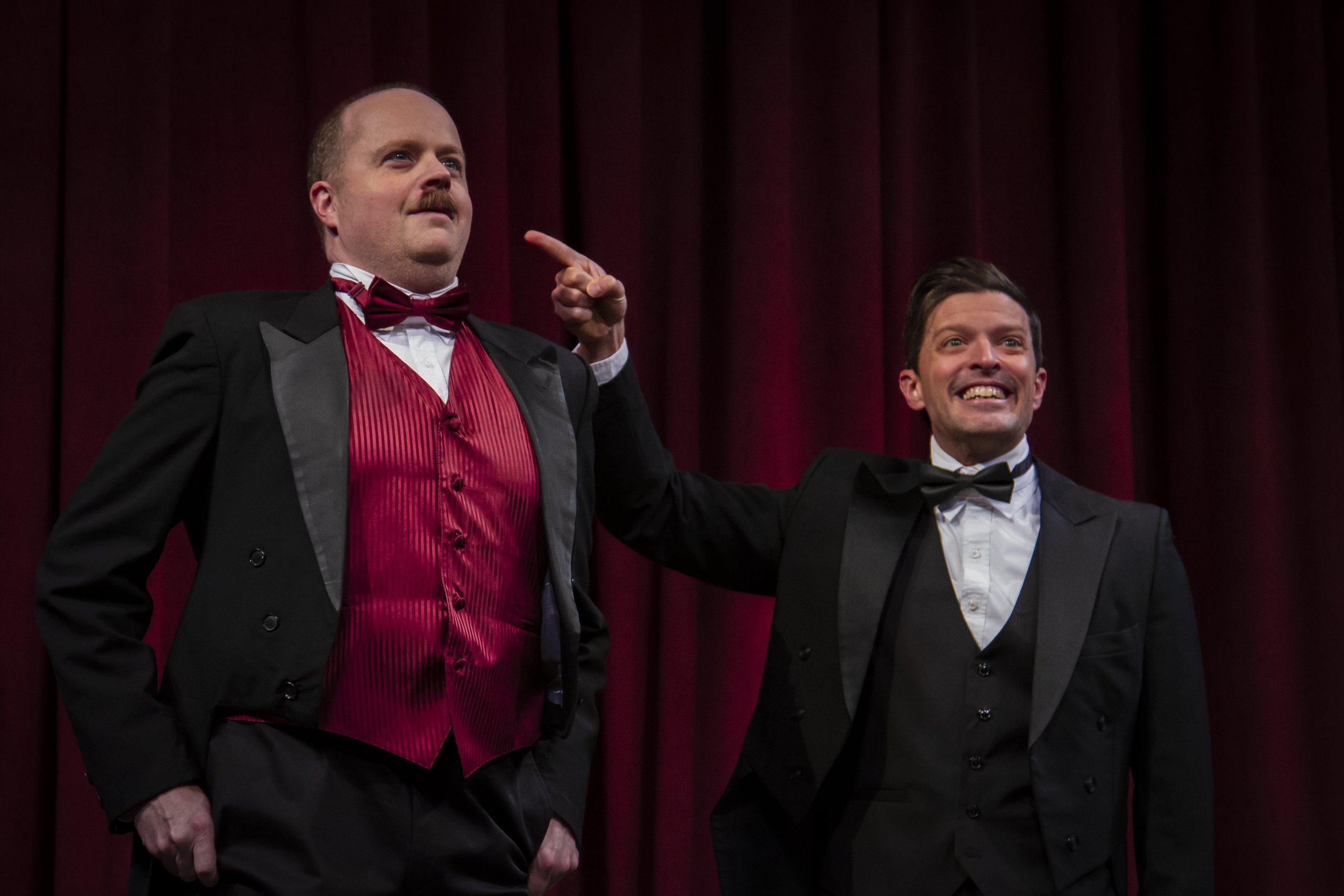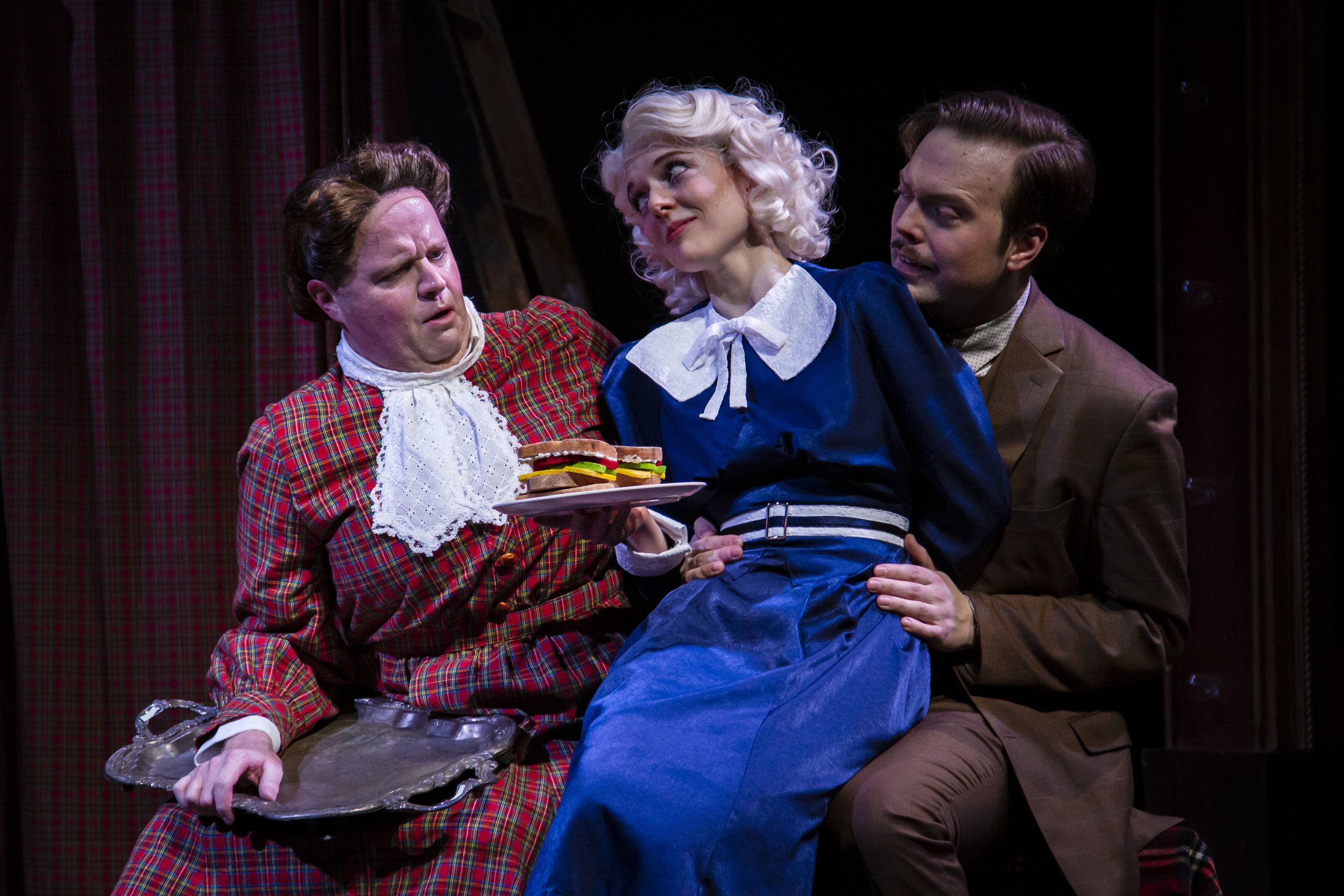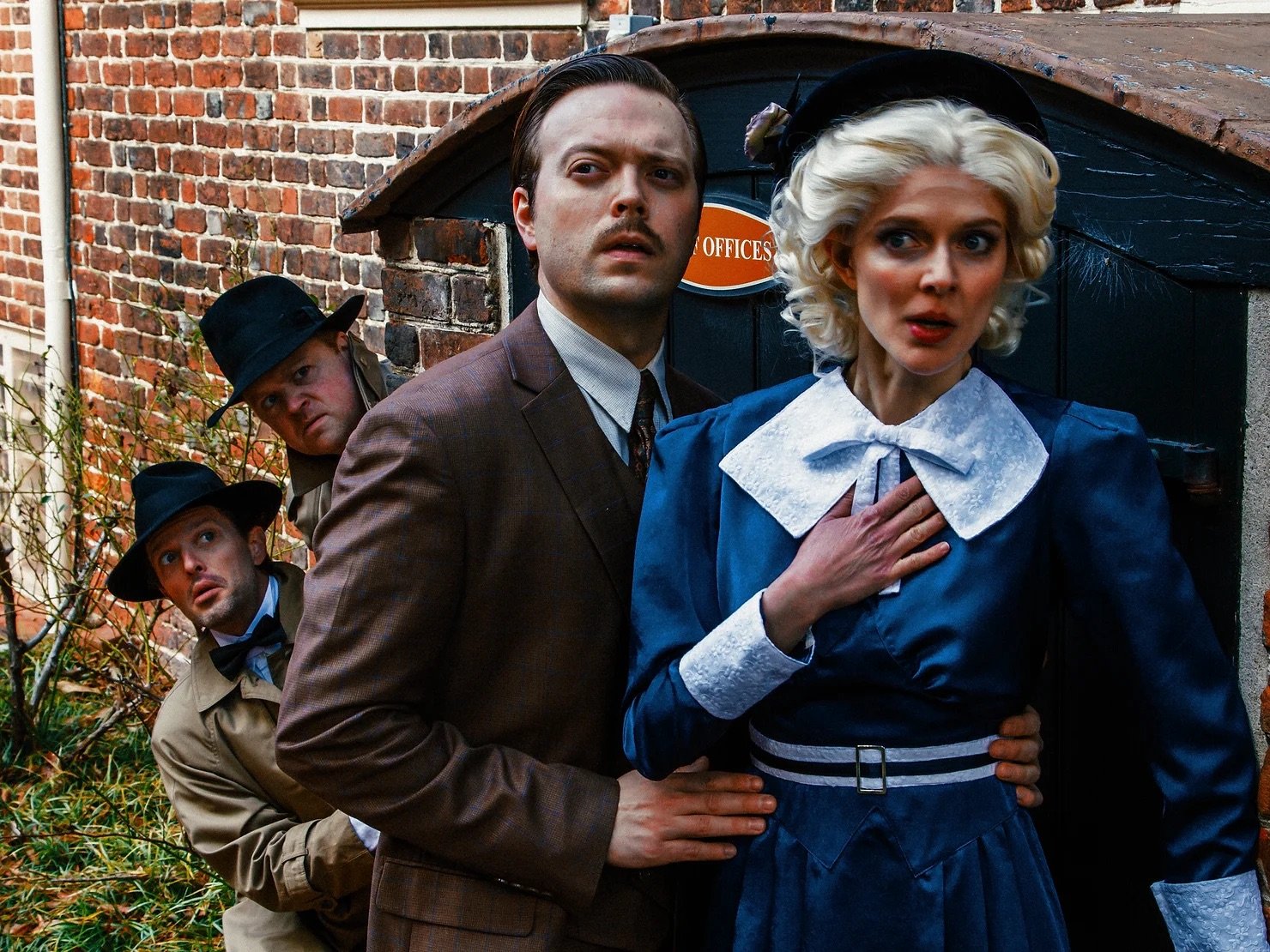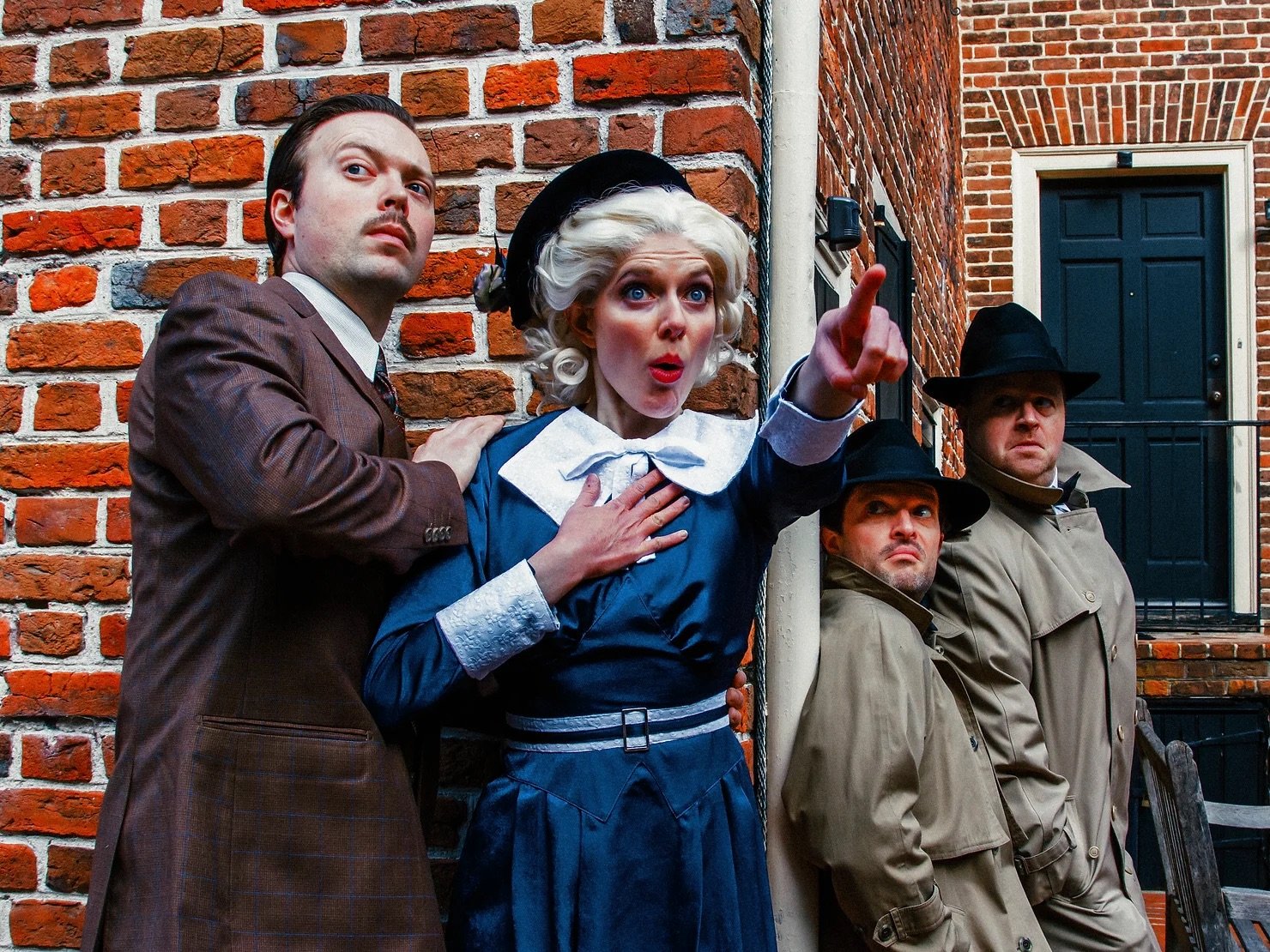In cooperation with Virginia Stage Company, “Every Brilliant Thing” comes to the Suffolk Center for Cultural Arts stage Wednesday, May 31 for two free performances. The first is a school matinee at 10 a.m., with an evening performance at 6 p.m. “Every Brilliant Thing” is presented for free during May Mental Health Awareness Month…
Avenging angel Nina Simone swoops down from the heavens to sing at the Wells Theatre
By Page Laws
Virginian-Pilot Correspondent
May 11, 2023 at 7:44 am
An angel, as active in death as she was in life, is here in town and ready to fuss about justice:
Don’t tell me
I’ll tell you
Me and my people just about due.
Yolanda Rabun as Nina Simone. (Ken A. Huth)
The title of the song from which that lyric comes, “Mississippi Goddam,” also provides a less-than-subtle clue:
Nina Simone was a troubled (probably bipolar), often angry, artist, hounded out of a classical music career because of her race. But she was and is (especially as reincarnated through Sunday at the Wells Theatre by supercharged actor/singer/lawyer Yolanda Rabun) quite ready to sing her soul out in an effort to save ours, both as individuals and a nation.
The one-woman show is called “No Fear and Blues Long Gone: Nina Simone,” by playwright Howard L. Craft, and that title, too, is telling. The scared little girl who became the international singing legend was born Eunice Kathleen Waymon, in 1933, the sixth of eight preacher’s kids, about 400 miles from the Wells, down in Tryon, North Carolina. More about the Tar Heel connection later. She mostly got over being scared; she likewise dismissed the blues as “her” genre. She sang all genres, and fiercely.
Eunice was allowed to study piano and proved so talented she was also permitted to study at Juilliard. But the world wasn’t ready for, in her own words, “Black fingers” on a classical keyboard. A young Simone (she rechristened herself after tough, beautiful French acting sensation Simone Signoret) had no choice but to sing for her subsistence and later write and sing all manner of her own and others’ popular and political songs.
In her remarkable career, Simone befriended a bevy of other major Black artists and leaders, including Martin Luther King Jr. and Malcolm X. Following the lead of Josephine Baker, Richard Wright and many others, including her friend and fellow artist James Baldwin, she eventually chose exile in Africa and Europe. As with Baldwin, Simone’s politically charged life ended in France, in 2003.
But it’s the North Carolina connection that runs particularly deep in the Wells production. Every principal involved — playwright Craft, actor Rabun and director Kathryn Hunter-Williams — sports a dab of tar on his or her feet for some reason, with this particular version of the show also having been developed at PlayMakers Repertory, Chapel Hill.
The show, as seen in dress rehearsal, was still understandably rough with delayed lighting cues, one case of forgotten lyrics (deftly handled and soon recalled). Rabun, as full of vim and vigor as Simone must have been, powers through all discrepancies to seize the stage and audience by the scruff of our necks. There are only 10 songs, with at least one other, Simone’s version of “I Put a Spell on You” (by Screamin’ Jay Hawkins, 1959) noticeably absent and missed.
Yolanda Rabun as Nina Simone. (Ken A. Huth)
There’s also a good bit of actor/audience banter and a somewhat methodical account of biographical highlights. Rabun switches costumes onstage, going from one gown to another, from a tank suit with cowboy boots (quite the look!) to a lovely dashiki. She occasionally rests on a divan or chair center stage, her three-piece band sitting always stage right. The gentlemen acquit themselves well, but sometimes their limited number seems a false economy. A trio can create only so big and varied a sound.
Simone shares anecdotes about her two husbands and countless affairs, one with an unidentified “prime minister.” She says of one husband: “He never lied to me … (perfect beat) … until he did.” Husband Andy physically abused her and tried without success to rein in her political activities. There were sometimes violent altercations with record executives, who, she felt, cheated her all her life. When (self-)accused of shooting a record executive, she clarifies for the audience, “I shot at a record executive.” We sense her deep anguish at the deaths of King and Medgar Evers, but especially at the killing of the four little girls in Birmingham (Sept. 15, 1963). She has the audience repeat each child victim’s name out loud.
The premise of Simone’s visiting us from the afterlife allows for witty commentary on developments since her death. She’s proud of the protest tactics of Colin Kaepernick, but she’s equally eager to return to heaven to party with folks like Langston Hughes and Tupac (who strikes her as fine-looking).
She touches briefly on the time, when she was still on Earth, that she swallowed 35 pills … and lived. Her two psychiatrists never helped but so much.
Since she’s now appearing from the afterlife, she’s quite comfortable with computers and takes some (fictitious) questions from the online public. She grapples briefly with her invisible-to-us, long-disapproving mother and her own, much-loved daughter Lisa Simone, herself a singer and a documentarian of her mother’s life. The film her daughter worked on, “What Happened, Miss Simone?” (2015), is part of a still-breaking wave of plays (including last year’s “Bessie, Billie and Nina: Pioneering Women in Jazz” at the Attucks), films, books, song remixes, etc., that keep the Simone legacy alive.
Most recently and of possible interest to those in Hampton Roads is the restoration of Simone’s home in Tryon, thanks to the support of the African American Cultural Heritage Action Fund, part of the National Trust for Historic Preservation. In fact, on May 20, there will be a gala at New York’s Pace Gallery and, into May 22, an online auction by Sotheby’s devoted to raising additional restoration funds. (See pacegallery.com/nina-simone or savingplaces.org/supportnina.)
Were Simone actually still among us, she would doubtless have supported Black Lives Matter and all other efforts to fight racial injustice and, the bane of her life, racial hypocrisy. In the Wells offering — rough as it was when I saw it — Simone quotes an odd but telling observation she attributes to Malcolm X: “You can put kittens in the oven, but that doesn’t make them biscuits.” You can deny the validity of Black history, but that doesn’t mean it didn’t happen.
To chase the kittens/biscuits image from your mind, here’s another line from the show’s “Mississippi Goddam,” perhaps just as telling and rightfully disturbing:
Lord have mercy on this land of mine
We all gonna get it in due time.
Tell it, Nina, from wherever you are.
Page Laws is dean emerita of the Nusbaum Honors College at Norfolk State University. prlaws@aya.yale.edu
Original Story Linked Here at The Virginian-Pilot
___
If you go
When: 7:30 p.m. Thursday; 7:30 p.m. Friday; 3 and 7:30 p.m. Saturday; and 2 p.m. Sunday
Where: The Wells Theatre, 108 E. Tazewell St., Norfolk
Tickets: Start at $35
Details: 757-627-1234, vastage.org
Actress Yolanda Rabun channels Nina Simone in new play from VSC on Coast Live
HAMPTON ROADS, VA. — Actress Yolanda Rabun joins Coast Live to discuss her upcoming role in the Virginia Stage Company's "No Fear and Blues Long Gone: Nina Simone," and shares a look at her unique take on the legendary singer.
No Fear and Blues Long Gone: Nina Simone
by Howard L. Craft
Directed by Kathryn Hunter-Williams
May 10 -14
Wells Theatre, Norfolk
This 90-minute, one-woman show features the Jazz legend and Civil Rights activist when she returns to present times to address certain events in her life, answer questions and leave her audience with a unique perspective on dealing with fear and current events in our world today. Featuring some of Ms. Simone’s greatest hits including “Don’t Let Me Be Misunderstood”, “I Wish I Knew How it Would Feel to Be Free”, “Feeling Good” and “Young, Gifted and Black”.
Paid for by Virginia Stage Company
vastage.org
Box Office: 757-627-1234
Original Story Linked at CoastLive.com
Combative and compassionate, ‘Henry V’ conquers at the Wells Theatre - The Virginian Pilot Review
NORFOLK — “O for a muse of fire” to properly praise this ambitious, wise, contemporary-in-spirit, production of Shakespeare’s best-loved history play by Virginia Stage Company and Norfolk State University.
It stars invincible NSU and Brown University acting alum Christopher Marquis Lindsay at the perfect age, physique and point in his burgeoning career to embody England’s warrior king in the last (1599) of what’s known as the bard’s second tetralogy. This quartet of plays includes “Richard II” (about Harry’s father Bolingbroke’s usurpation of the throne to become Henry IV); “Henry IV, Part One” (about Harry’s, a.k.a. Hal’s, misspent youth hanging out with Falstaff); “Henry IV, Part Two”(more Hal and Falstaff); and our play “Henry V,” about Hal/Harry’s own kingship and conquest of France).
Derrick Moore, left, as the Duke of Exeter and Christopher Marquis Lindsay as Henry in "Henry V" at the Wells Theatre through April 30. (Samuel Flint)
Shakespeare buffs will recognize “O for a muse of fire,” as the prologue/chorus’ opening line which is replete with similar “greatest hit” speeches (e.g., “Once more unto the breach, dear friends, once more” in Act 3; “We few, we happy few, we band of brothers…” in Act 4 and “A little touch of Harry in the night,” also Act 4. The great speeches have thankfully been preserved in this judiciously cut version.
Though “O for a muse of fire” was nicely performed on April 13 by NSU alum Terrance Livingston, Jr., Livingston will cede that part to the play’s director Tom Quaintance at selected performances (check with the box office). Other illustrious former Spartans in the show include Derrick Moore as the Duke of Exeter; Corey Edward as Earl of Cambridge/Michael Williams; and KeeAjah Baldwin as Duke of York/Sir Thomas Grey. The older pros are joined by eight current students, some playing major roles such as Princess Katharine (Vania Aursby, who’s already made her mark locally at the Generic and Old Dominion University Rep.)
Add in a good handful of local and imported VSC regulars — e.g., Ron Newman as King of France/Sir Thomas Erpingham; Jeffrey Haddock as the insufferable Dauphin (who first appears, hilariously, with the other French nobles in the tony Wells’ box seats); and Julian Stetkevych as Canterbury/Fluellen/Orleans)—and you have two armies’ worth of actors on a mostly bare, intentionally rough-hewn looking thrust stage, created by designer Dahlia Al-Habieli. The open-to-view under-thrust doubles nicely as siege trenches or “mines.”
Costumes by resident designer Jeni Schaefer are well-worn contemporary outdoor garb, occasionally embellished with low-tech coats-of-arms ribbons or torn, dirty armbands to help keep double-and triple-cast actors identifiably English or French. Women actors Sarah Manton (Montjoy/Hostess), Meg Rodgers and Anna Sosa play both genders, Rodgers stepping up as the feckless corpse-robbing Pistol and Sosa as the acne-challenged Bardolph.
The latter two n’er-do-wells, plus Nym (Miguel Girona), are part of what one might dub “Team Falstaff,” the group of lowlifes with whom then-Prince Harry hung out in his youth. When “Henry V” begins, Falstaff is a bed-ridden offstage character suffering from his life of drinking, whoring and Prince Harry’s stunning rejection of his company in “Henry IV, Part 2.”
Falstaff expires, still unseen, in Act 2, with only the Hostess (Manton) to witness and skillfully convey the manner of his going: “For his nose was as sharp as a pen,” [odd for a notoriously fat man] and he “babbled of green fields.” Perhaps his last moments were, after all, some bucolic dream. With Falstaff gone, the audience watches to see how King Harry will treat his former buddies from Team Falstaff (Pistol, Bardolph, Nym, etc.). He consistently shuns them, in some of the play’s coldest, but, as we’re made to think, necessary moments.
The play — in fact, the whole tetralogy — invariably comes down to how audiences judge this Henry’s all-important character. Henry at any age can be cruel — indeed the historical Henry V, according to most historians and critics such as Herschel Baker, was by no means a charmer. But Shakespeare’s Henry V is, and, perforce, must be one, since the whole second tetralogy leads up to his miraculous victories at Harfleur and, especially, Agincourt.
In this play, Shakespeare reaches the heights of his patriotic theme: England now and forever. And Henry V, warts and all, IS England, sometimes mistaken (the scenes in which corrupt bishops support Henry’s genealogical claim to the French throne via Edward the Black Prince and Salic law are comically obtuse), but always, somehow, winsome. That’s because Henry V, even when he’s hard (ordering French prisoners to be killed or allowing a miscreant such as Bardolph to be hanged) is consistently self-questioning, self-effacing (especially with his betrothed, Kate) and patriotic.
Julian Stetkevych, right, and the cast of "Henry V" playing at the Wells Theatre through April 30. (Samuel Flint)
That’s why the play was so popular during World War II. Laurence Olivier’s 1944 film adaptation fit its times; Kenneth Branagh’s heroic 1989 film aspirationally still fits ours.
The play is always being done somewhere where English (and a bit of mangled French) is spoken or translated. And speaking of the brief French scenes, NSU theatre’s producing artistic director Anthony Mark Stockard served as voice and speech coach with no other dialect or French coach listed.
The actors’ French was somewhat rough (sometimes part of the plot), but it always flowed — the theatrical illusion of fluency (e.g., for the French Princess Katherine) being far more important than linguistic accuracy. Perhaps more could have been done to suggest Fluellen’s Welsh accent (Irishman MacMorris and Scotsman Jamy having been cut from the play). One loses thereby Shakespeare’s comic interplay of U.K. subcultures.
But never elided is the other glorious theme of this play: theatricality itself – both its limitations and infinite possibilities. “Can this cockpit hold/ The vasty fields of France? Or may we cram/ Within this wooden O the very casques that did affright the air at Agincourt?” The answer is no; of course, you can’t fit thousands of soldiers on a stage. But the answer is also a triumphant yes; you can conjure up such an image in your audience’s imagination, even as you deny it.
In the play’s first moments, Livingston stepped forward to deliver the familiar pre-curtain speech: “We wish to thank our sponsors … ;” “Please turn off your cellphones,” but then … theater happened!
Livingston unexpectedly lifted his voice to speak the famous first words of the show, leaped onstage and took us to where only art can go. As important as historical accuracy may be (the real Henry V probably was a jerk), we got the patriotic, still revelatory “Henry V” we need for today: Shakespeare’s own words, skillfully rendered and triumphantly true. Theatricality conquers all.
Page Laws is dean emerita of the Nusbaum Honors College at Norfolk State University. prlaws@aya.yale.edu
Black women rule in Virginia Stage Company’s ‘Angry, Raucous, and Shamelessly Gorgeous’
Left to right: Teri Brown, Patricia Alli, Mikayla Lashae Bartholomew and Bethany Mayo in Virginia Stage Company's production of "Angry, Raucous, and Shamelessly Gorgeous." (Samuel Flint)
NORFOLK — Blow, Gabriel, blow! We now have the first anti-August Wilson problem play, though it ends up being more a tribute to him than a bashing.
Audiences are again convulsing at the Wells, this time at a comic tradition — Black women fussing and cracking each other up — even more venerable than the British music hall tradition of Virginia Stage Company’s last comic gem “The 39 Steps.”
The current offering with the tough-to-remember title was written by Pearl Cleage, a Black playwright with an outsized rep (though not so large as that of Wilson — the late author of the “Century Cycle” of 10 plays, one depicting each decade of the 20th century, the most famous being “Fences”).
Cleage’s play, expertly directed by Virginia Commonwealth University theater scholar Tawnya Pettiford-Wates, concerns four Black women united by their profession — theater — though one of them, former diva actor Anna Campbell (Patricia Alli), hasn’t had a role in two years. (She has, notably, been living for decades in Amsterdam trying, until recently, to drink up everything but the canals.)
The other three women are her best friend and manager Betty Samson (Teri Brown), her producer Katie Hughes (Bethany Mayo, also VSC’s director of education) and Precious “Pete” Watson (Mikayla Lashae Bartholomew). The last one is Anna’s replacement in her best-known role, but, at the evening’s start, Anna doesn’t know this. (She thinks she herself is reprising it.) Did I mention “Pete’s” theatrical connection involves dancing and poles?
Mikayla Lashae Bartholomew as Precious “Pete” Watson in Virginia Stage Company's production of "Angry, Raucous, and Shamelessly Gorgeous." (Samuel Flint)
Anna has been invited to current-day Atlanta for a theater festival giving her a lifetime achievement award and presenting a performance of “Naked Wilson” (which, so far as I know, exists only in Cleage’s imagination). Kate reminisces about the day a much younger Anna invented her signature part: “One brave woman doing all those fabulously male monologues, alone on the stage, naked, just to make a point about the silencing of women. It was nothing short of revolutionary.”
Decades later, however, they’re having trouble selling tickets to the reprise of “Naked Wilson,” because “August Wilson is a powerful presence and people are afraid the piece is disrespectful.”
And that was indeed my reaction on first hearing about Cleage’s play “bashing” Wilson for being chauvinistic. “But what about Ma Rainey in ‘Ma Rainey’s Black Bottom’ (1982) and Rose Maxson in ‘Fences’ (1984) and Berniece in ‘The Piano Lesson’ (1986) and Aunt Esther in ‘Gem of the Ocean’ (2003) and (indirectly) in ‘Radio Golf’ (2005)? Aren’t they all great parts for Black women?”
But, as Cleage seems to counter, Wilson did do more for Black men.
Says Anna: “But the story was always and forever about their blues, not ours.”
Betty concurs: “That’s what we were so mad about.”
But since then, Betty and Anna, now both 65, have declared a “truce” with Wilson, chauvinist or not.
This is the first time the VSC has produced a play composed only of Black women actors and directed by a Black woman, Pettiford-Wates, who brought a gifted cast of designers from VCU.
The play is set entirely in a swish Atlanta hotel suite, true in its stage appearance to its supposed $500-a-night price tag. Betty, Anna’s manager and companion, is already there, serving as glue for the evening. Her compulsive solitaire-playing and whispered blessing/prayer “Ashay” (“Amen” in some African and Asian cultures) take us from scene to scene. Brown bears the burden of lots (perhaps a bit too much) “time-is-passing” stage business. But Brown bears up nicely, also bearing, in character, with her friend’s diva-like ways. Anna enters in fabulous African-patterned silk pajamas (courtesy of VCU-trained costume designer Nia Safarr Banks). She is obviously looking forward to what she thinks will be her big comeback. She’s prepared to bare her 65-year-old body; unfortunately, she has misinterpreted the Atlanta festival invitation. As the audience soon learns, festival producer Kate has always intended that a younger actor play the “Naked Wilson” part.
The first hurdle is disabusing Anna of her misconception. The second is getting her to accept her replacement, the untrained “Pete,” a tall, voluptuous woman whose flashy clothing and makeup choices (too much bronzing) along with her body language (a louche slouch, with feet on the furniture), epitomize the generational and educational gulf between her and Anna. The two clash, loudly and repeatedly, with Anna eventually reporting Pete’s impending nude performance to the police.
But then Pete, a performance artist at heart, holds a nighttime solo show atop, of all places, Margaret Mitchell’s House. As the author of “Gone With the Wind,” Mitchell represents the purest remnant of Lost Cause racism. Pete has only seen only the 1939 film version, but she almost instinctively disses Mitchell by performing Rose Maxson’s self-assertion speech from “Fences,” and singing “Oh! Susanna,” in Spanish for extra — if unintentional — alienation effect. Her performance is brilliant, perfectly transgressive, and even honors Anna, whose real full name is Susanna, for the character in a Langston Hughes poem. While atop the roof, Pete is mistaken by a street lady for a Wilsonian angel figure. (Think Gabriel in “Fences.”) A video of the performance goes viral and suddenly things are looking up for “Naked Wilson” — if only the constant rain will stop at the outdoor venue. Will benevolent Wilsonian ghosts prevail?
Toward the end of the play, Anna confesses the motive behind her first miraculous performance of “Naked Wilson”: “I didn’t do it because I was mad at August. I just wanted to feel his words rolling around in my mouth and see if I could feel them coming out through my skin, which is why I had to take my clothes off. I was so in love with the words.” Cleage is none too shabby a wordsmith herself.
Wherever you are, Mr. Wilson, Ashay. Pearl Cleage has your back.
Page Laws is dean emerita of the Nusbaum Honors College at Norfolk State University. prlaws@aya.yale.edu
___
If you go
When: Through March 19
Where: The Wells Theatre, 108 E. Tazewell St., Norfolk
Tickets: Start at $35
Details: 757-627-1234, vastage.org
"Angry, Raucous & Shamelessly Gorgeous" at the Wells Theatre on Coast Live
See the Original Story Here
NORFOLK, Va. — Actresses Mikayla Lashae Bartholomew and Patricia Alli join Coast Live to share a special look at "Angry, Raucous & Shamelessly Gorgeous," a wild and fun show from Virginia Stage Company that you can catch now through March 19 at the beautiful Wells Theatre in Norfolk!
"Angry, Raucous & Shamelessly Gorgeous"
Written by Pearl Cleage
Directed by Dr. Tawnya Pettiford-Wates
March 1-9, 2023
Tickets available at vastage.org or by calling the box office at (757) 627-1234.
Synopsis of the play from vastage.org:
Tickets Available Here
"When actress Anna Campbell is invited to restage her radical performance piece of re-imagined scenes from August Wilson’s play, she is surprised to learn she will not be taking center stage. A much younger entertainer will be stealing the spotlight at a new women’s theatre festival. Will they be able to build a bridge between their generations, or will the curtain close on Anna’s career? "
‘39 Steps’ at Virginia Stage Company is flat-out funny
By Page Laws
The Virginian-Pilot | Jan 31, 2023 at 1:46 pm
NORFOLK — What’s so funny?
Well, I’d have to be a psycho to try to explain why “The 39 Steps” at Virginia Stage Company is so flat-out funny. I’m getting vertigo at the very thought of such scholarly acuity and daring! But here goes.
Step aside, Aristotle. Dr. Laws will attempt to explain why this MacGuffin-filled takeoff on Alfred Hitchcock and other old spy-thrillers can make a body ache with laughter.
My first indication of monkey business was the presence of two new mezzanine-level theater box seats built far downstage right and left, plus a new large cameo portrait — the outlined profile of a chubby man’s face — at the apex of the proscenium. The profile seemed to match a curious disembodied slow and creepy voice that intoned “Good eeeevening,” and proceeded to warn the audience to turn off cellphones or face dire consequences. But why “remodel” a theater that’s on the National Register of Historic Places?! Why add fake box seats (later seized upon by the actors for their antics) when there were already lots of them available? Perhaps they didn’t want the genuine ones covered with blood?
But don’t bother looking for 39 steps — to the mezzanine or anywhere else. What are “The 39 Steps”?
Shtick around. Maybe someone will let us know. …
But first let us dispense with the provenance of the production in question, taken from the Samuel French print edition: “The 39 Steps, adapted by Patrick Barlow from the novel by John Buchan from the movie of Alfred Hitchcock licensed by ITV Global Entertainment Limited and an original concept by Simon Corble and Nobby Dimon.”
For a sense of historical context, the novel dates from 1915 and Hitchcock’s movie from 1935.
The VSC production has a similar hero, Richard Hannay, played by an agile, cheeky fellow named James Taylor Odom who is tasked with saving England and therefore the world from a dastardly Nazi masquerading as a British Professor Jordan (who, like his castmates, plays many other parts). The actor is one Steve Pacek, last seen as Miss Tracy Mills in “The Legend of Georgia McBride.”
Pacek is also billed as “Clown #2,” implying the presence of a “Clown #1,” who indeed exists and is deftly played by Michael Di Liberto (a master of half-audible, comic, mumble speak). Kristen Hahn joins in as Annabella Schmidt, Margaret, Pamela, and any other female role that sashays her way and hasn’t been grabbed by one of the men.
All four actors are brilliant physical comedians, guided by a clearly sadistic director, one Mark Shanahan, who is surely making actors run and jump and role-switch much faster than Actors Equity allows. To prove my point, the stage directions on Page 96 of the French edition read: “Quite a lot of this show depends on your actors’ level of Olympian fitness. It has proved an invaluable aid to weight loss.”
Weight loss? As if that were ever desirable!
At any rate, there are four actors playing dozens of witty/witless characters. Their goal? Apparently to mock every conceivable cliche from the Golden Age of Cinema, with special attention to the portly Master of Suspense and his oeuvre. (“Good eeeevening!”) Someone is also out to disembowel the very notion of a spy mystery, using slow, terrifying cruelty and questionable wigs.
Here are just a few of the shticks that poke at the ribs of spy-thriller fans.
Hannay, our world-weary hero, begins his efforts to cheer himself up with a trip to the theater, where he meets the English (or is she a Nazi?) agent Schmidt watching an elaborate music hall number. Mr. Memory (Di Liberto) and his “compère” (emcee, played by Pacek) do an outrageous act where Mr. M is supposedly asked questions by the Wells audience. (When the compère “repeats the question,” he’s actually planting a planned query for his partner to answer onstage.)
The funniest part is their exaggerated bows to one another and the repetition of “Thankoo” (cockney for “Thank you”). This is just the start of the ongoing accent shticks, hilariously mocking Oxbridge English, German and Scottish (Schmidt constantly switches her English V’s for W’s, and D’s for T’s — classic giveaways of a native German speaker). The “ch” at the end of German words is gargled and fairly spat across the stage; likewise, the “ch” ending on Scottish words is delivered with a choking bark: “Alt-na-Shellach!” (It takes about 10 seconds to expectorate that one.) Another nice trick when accent-mocking is using naughty words (untranslated) from that language. Annabella Schhhhhh-midt (“Sch” is lengthened) is fond of saying “Scheisse” for … well, ask your local German.
Talking funny is coupled, as mentioned, with pure physical comedy of the highest and fastest order (except when exaggerated slow motion is called for). The overall joke of the play is the playwright’s implicit insistence that anything film can do, theater can do better. We, therefore, get exaggerated light, wind and sound effects meant to recall every train scene in cinematic history. Though you can’t easily put a train car onstage, you can place two actors closely standing across from two other actors to mime moving within the close quarters of a train compartment. Awkward intimacy is involved each time somebody comes or goes. It’s mime time sublime.
My favorite related film shtick is the “wind” effect, necessary each time the train compartment door opens and repeated later out on the heath where Hannay runs to escape his assailants. There’s no real wind, just a lot of choreographed clothes-shaking to simulate the wind hitting cloth.
I’ve never seen a better example than Odom’s wind shakes. Odom’s likewise a hit in his “escaping from beneath the female corpse” and his “escaping as a handcuffed couple” routines, both of which also require the antics of the talented Hahn. Di Liberto and Pacek deserve commensurate awards for their quick-change “hat tricks” and duck-and-cover instant costume changes. In the climactic melee back at the London Palladium (Mr. Memory is on again), Pacek gets to spout a line not in the script that definitively and hilariously shatters the “fourth wall” between the audience and players.
As his evil Nazi guy Jordan gets shot by an unknown assailant (all four actors are standing innocently onstage), Pacek shouts in a final complaint: “It was supposed to be a cast of four!”
One final bit of praise for this manic masterpiece: Some of its silliness is soulful. Listen for the scripted “extemporaneous” speech Hannay is forced to make when he tries to hide out on the lam at a political rally.
Hannay calls for “A world where no nation plots against nation! Where no neighbor plots against neighbor, where there’s no persecution or hunting down, where everybody gets a square deal … A world where suspicion and cruelty and fear have been forever banished!”
What a funny idea! (Not.)
And what are “The 39 Steps”?? A gang of Nazis, a secret aeronautics plan, a MacGuffin (red herring, in Hitchcock-speak)?
You got me! Or maybe I got you … .
Page Laws is dean emerita of the Nusbaum Honors College at Norfolk State University. prlaws@aya.yale.edu
——
If you go
When: 7:30 Wednesday through Friday; 3 and 7:30 p.m. Saturday; 2 p.m. Sunday
Where: The Wells Theatre, 108 E. Tazewell St., Norfolk
Tickets: Start at $35
Details: 757-627-1234, vastage.org
The 39 Steps Goes Off Without a “Hitch”cock! Review from HR Spotlight
Dial “M” for “Must-See”…wait, wrong movie…
Words by Nathan Jacques. Images courtesy of the Virginia Stage Company.
It was a dark and wintry night on the streets of Norfolk, Virginia. A frigid breeze chased us down Granby street to the elegant Wells Theater. Alleyways on all sides were abounding with eerie shadows and unsettling sounds. Who (or what) could have been lurking in them? Yes, the setting was reminiscent of those often pictured in stories and films, saturated in intrigue and mystery; what on earth was in store for us? As we arrived at the remarkably ornate auditorium, we were met with…an exceptionally written and uproariously clever comedy based on an exceedingly dark film and book. Wait, what?
The 39 Steps first teased the brains of readers as a novel by John Buchan, published in 1915 during the thick of World War I. The public is likely more familiar with the 1935 Alfred Hitchcock adaptation of the novel, which is lauded as one of the best entries in Hitchcock’s filmography. Patrick Barlow adapted the story for the stage in 2005 and took quite the liberty in doing so – this new, improved version of The 39 Steps took one more step in a new direction; he went and turned it into a sidesplitting comedy that absolutely nails every gag and gaff within the script, well-earning each giggle and guffaw it elicits from its audience. It remains a classic tale of a man on the run, encumbered with the fate of his nation, but the refreshing, new tone of this staged version will prove itself as a classic, too. Unlike Hitchcock, I do not offer you a perplexing mystery; rather, let me offer a clear answer on whether you should see this production or not. To put it plainly, you’d have to be a “Psycho” to skip out on this one.
I am chuffed to inform you, dear reader, that Virginia Stage Company’s production delivers a farcically genius rendition of this very same play. Director Mark Shanahan, his production team, the cast, and crew all exhibit pure aptitude in bringing a tantalizing Broadway-quality performance to Norfolk audiences.
This cast does not suffer from “Stage Fright”. The principal, James Taylor Odom, is nothing short of spectacular. His performance as the hunted Richard Hannay oozes with charisma; with that said, Mr. Odom is every bit an athlete as he is an actor. The script calls for a seemingly insurmountable order of physical comedy but – have no fear – Mr. Odom makes it look easy! Don’t worry- the rest of the four-person cast, who all embody an exceptionally long laundry list of characters, are fantastic as well. Kristen Hahn offers an equally brilliant performance as various characters, including Pamela. Michael Di Liberto and Steve Pacek cover (literally) everyone else. Ms. Hahn, Mr. Di Liberto, and Mr. Pacek all offer performances for the ages, effortlessly morphing into different personalities that all manage to have distinct attributes and dialects. Never once did I find myself confused about who someone “was”. I did, however, find myself baffled about how such a miniscule cast could possess such incredible skill. Bravo, all – you got a standing ovation from me! If I keep going, you, dear reader, might become “The Man Who Knew Too Much”, so I will refrain from spoiling any surprises.
Such marvelous performances are impossible without the production teams and crews that make them happen. “I Confess” that costume designer Jeni Schaefer deserves special recognition for the Herculean effort of clothing all the quirky personas the cast members embody throughout the night. My hat goes off (ha!) to all the costume change specialists backstage as well, who go unnamed in the playbill.
Scenic designer D. Craig M. Napoliello and Assistant Scenic Designer Chen Wei-Liao take the “less is more” approach, and it pays off – such a fast-paced fiction requires a setting that can keep up with it. Richard and the cavalcade of characters that follow him move quickly, and the scenic designers have masterfully crafted a set that never once falls behind. A special round of applause is in order for Lighting Designer Alyssandra Docherty, Sound Designer Ryan Rumery, and Sound Engineer Shyloh Bailey, too – not a single cue felt “off”. In fact, many scenes where no set was present at all felt complete and full of life, thanks to well-timed sound cues and superb lighting schemes. The team director Shanahan pulled together is truly first-rate. I might not be able to keep myself from telling any “Strangers on a Train” I meet about how much I loved this production. It’s got me in a “Frenzy”.
The 39 Steps is one of Virginia Stage Company’s finest offerings thus far. I must admit, I have not seen the original Hitchcock film on which this play is based, but after seeing VSC’s version, I fear that the film might not hold my interest like this production did.
“Verti-go” to the box office website right this minute and procure a ticket at https://tickets.vastage.org/5646.
Original Article at HR Spotlight | https://www.spotlightnews.press/post/the-39-steps-goes-off-without-a-hitch-cock












